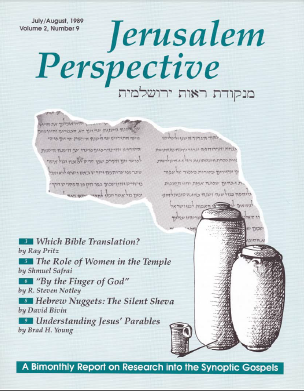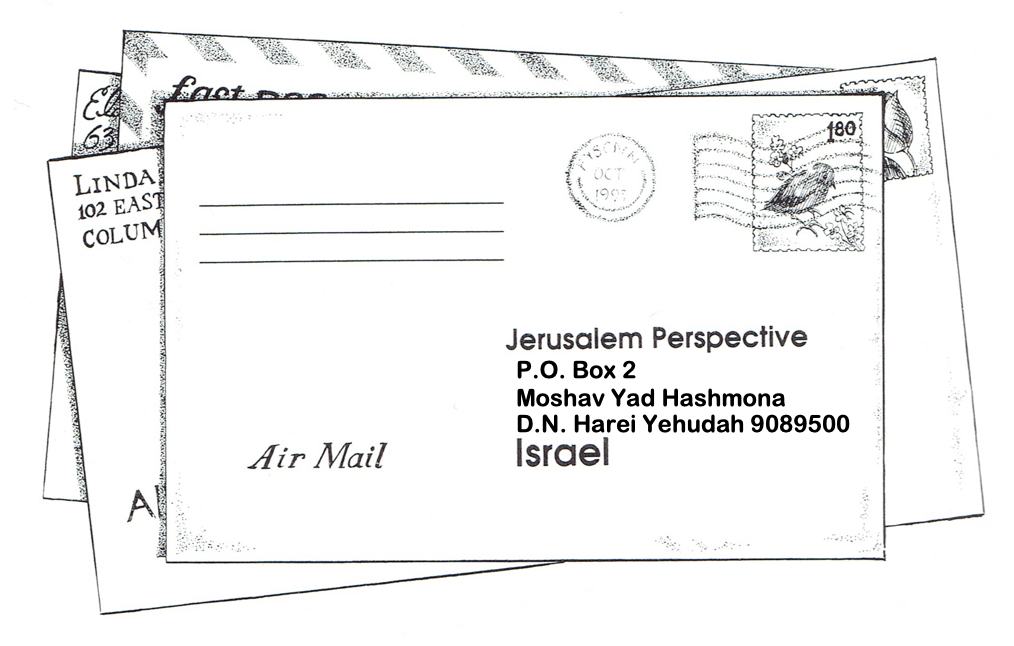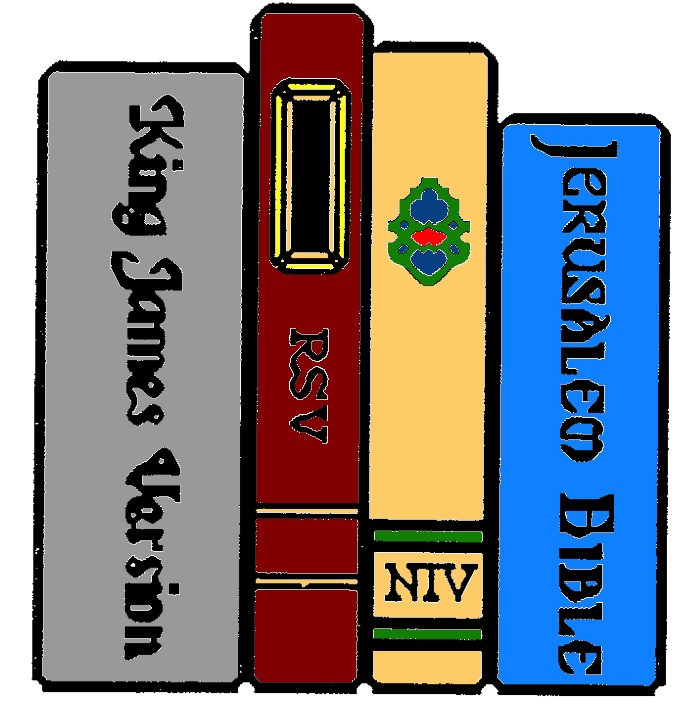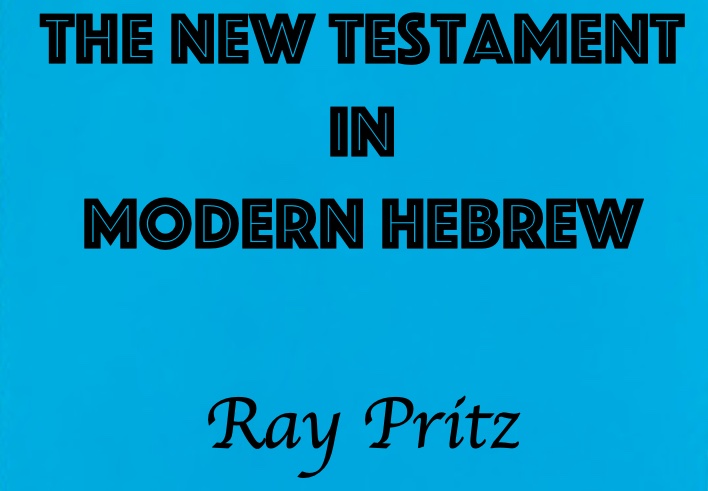Updated: 24 November 2023
Which Bible translation is the “most accurate” is a question that is frequently asked, and it is a common search on the internet. Perhaps that’s how you came to this web page. Jerusalem Perspective (JP) has been grappling with this question almost since its inception. It is a question that is easily asked but not so simple to answer.
One reader posed the question this way:
…I have had difficulty deciding which Bible to read. I had been strongly advised to read only the King James Version…. However, I have begun suffering doubts about the accuracy of the translations I am reading and have again been in search of what is considered the most accurate translation…. Naturally, I desire to read and understand the Word of God with the greatest accuracy possible. My question, quite simply, is which English language Bible would you consider and recommend as being the most accurate translation?
JP’s founder, David Bivin, responds:
This is an important question, and it raises a number of complex issues. The most accurate translation may not be the most literal. This is because idioms that make sense in one language do not necessarily make sense in another. On the other hand, a dynamic translation needs to be well informed about the ancient world of the New Testament, its history, its cultures, its languages and its world views or the dynamic translation can easily lead readers astray. These issues are addressed by the former head of the Bible Society in Israel, Ray Pritz, in his JP article, “Which Bible Translation?” Moreover, a version might hit the nail on the head when translating one passage, but fall short in another. There is no one translation in English or any other language that always gets it right all the time. In view of this complex situation, a simple answer to your question is not possible.
The truth is that nearly all English versions of the Bible are helpful in some respects, but many leave much to be desired. Unfortunately, no one translation can ever completely capture the full meaning of the original. However, in my experience, the following English versions are generally reliable:
For the Hebrew Scriptures (Old Testament):
- Tanakh: The Holy Scriptures, The New JPS Translation According to the Traditional Hebrew Text (Jewish Publication Society of America, 1982)
- The Bible, an American Translation (University of Chicago Press, 1935)
- The New American Bible (With the Revised Book of Psalms and the Revised New Testament) (Thomas Nelson, 1983).
For the New Testament:
- New International Version (NIV) Holy Bible (Zondervan, 1978)
- Modern Language Bible: The New Berkeley Version (Zondervan, 1969)
- The New Oxford Annotated Bible with Apocrypha: New Revised Standard Version (published jointly by Oxford University Press and Cambridge University Press, 1970).
In some ways it is easier to answer the question, “Which English translations of the Bible are the least accurate?” Overly literal translations can be misleading because they represent the words but not the meaning of the original. On this subject I refer readers to my article on “The Fallacy of Sacred Name Bibles.” Outdated translations that are full of archaic language that no one uses anymore, and are therefore difficult to understand (and easy to misunderstand), are also problematic. Such translations may have been excellent in their day, but like most things, their usefulness diminishes over time. On this issue, see the JP post by Dr. Randall Buth entitled “The ‘King James Only’ Debate.”
Ignorance about first-century Jewish customs and false assumptions about ancient Judaism can often be detrimental to translations. For instance, many New Testament translations refer to “prayer shawls” in Jesus’ critique of certain pompous co-religionists who ostentatiously wore long tassels on their garments, even though historians have learned that Jews did not wear prayer shawls in the first century.[4] Persistent adherence to traditional understandings of scriptural passages that deviate from the wording of the original text can also mar translations. For instance, Mark 7:18-19 is often translated along the lines of:
“Don’t you see that nothing that enters a person from the outside can defile them? For it doesn’t go into their heart but into their stomach, and then out of the body.” (In saying this, Jesus declared all foods clean.)
NIV
However, the words underlined above—”in saying this,” “Jesus” and “declared”—have no basis in the Greek text and merely reflect a traditional understanding of this passage. N. T. Wright’s New Testament For Everyone translation does a more accurate job of reflecting the wording of the Greek text:
Purchase a great ebook by David Bivin:
 |
This eBook (PDF format; $12.95) by David Bivin entitled New Light on the Difficult Words of Jesus is a powerful and thought-provoking study of the harder passages found within the words of Jesus.
One reader stated, “David Bivin makes these passages come to life. …now it is like I’m reading the Bible afresh.”
Another wrote, “Bivin has a way of writing that transcends your education and level of study. …I will recommend this book to all my friends.”
JP Premium Membership
You might also consider becoming a member of Jerusalem Perspective, which gives you full access to hundreds of articles, lectures, sermons, and more! 3-month introductory access for only $20.
“Don’t you see that whatever goes into someone from outside can’t make them unclean? It doesn’t go into the heart; it only goes into the stomach, and then carries on, out down the drain.” (Result: all foods are clean.)
NTFE
Nevertheless, Wright’s translation is still inaccurate with regard to the text’s meaning. Jesus did not mean that the Jewish dietary laws are no longer valid. He simply meant that what a person eats does not make him or her spiritually pure or impure, since the digestion process is a natural purifier. A better translation might be:
“Don’t you understand that anything external that goes into a person is unable to make him (or her) profane? For it does not go into the heart but into the belly, and then goes out into the latrine, thereby purifying all the foods.”
This statement could be understood in one of two ways: 1) the digestion process purifies the body of impure foods, or 2) the digestion process renders an impure substance (foods forbidden to Jews) into a pure substance (human excrement) that ends up in a latrine.[1]
Especially when it comes to the Synoptic Gospels, which likely reflect a Greek translation of a Hebrew source, there is as yet no completely satisfactory translation. If the Greek Synoptic Gospels are descendants of a Hebrew biography of Jesus, then even the greatest translator cannot succeed if he or she is oblivious to or ignores the Hebraic idiom of portions of these Gospels. No matter how well a New Testament translator knows Greek, if the translator is unacquainted with, for instance, the Hebrew idiom “bad eye” = “stinginess” found in Matt. 6:23, he or she will only be able to translate the Greek text literally, but will be unable to render the passage accurately. (By the way, James Moffatt’s The Bible: James Moffatt Translation [London: Hodder and Stoughton, 1913, revised 1934] correctly rendered Matt. 6:23 as, “if your Eye is selfish, the whole of your body will be darkened.”)[2] Similarly, if a translator is unaware that in Hebrew the same word (‘ir) serves for both “city” and “village,” then he or she will use “city” when translating passages that speak of Jesus’ hometown, because the Greek text has polis, a word that means “city” but not “village.” Greek translators tended to render ‘ir as polis, irrespective of the size of the population center it referred to. Although the English translation will be literal, it will still be inaccurate because Nazareth was just a small Galilean village in the first century. Or, to give a final example, if a Bible translator is unaware that in Hebrew there is only one word, yam, for both “sea” and “lake,” and that Greek translators always rendered yam as “sea,” no matter whether a saltwater sea or a freshwater lake was referred to, then he or she will use the English word “sea” instead of the more correct “lake” when translating Gospel passages that refer to the “Sea of Galilee.”[3]
The complexity of translating numerous passages in the Gospels is explored in the JP series “Meturgeman” (the Hebrew word for “translator”) by biblical languages expert Randall Buth. To view the articles in this series, click here.
Ray Pritz, former head of the Bible Society in Israel, offers a glimpse into the unique challenges of translating the New Testament into Modern Hebrew in his JP series “The New Testament in Modern Hebrew.” These challenges shed light on the difficult problems that all translators experience when attempting to express the thoughts conveyed in one language in the words of another language.
In general, it is helpful to read and compare as many different translations as possible. Often, after reading several translations, the meaning will become evident, as one translation may clarify which sense of a word or phrase is meant in another translation.
It needs to be added that the quest for a perfect translation of the Bible can be something of a distraction. There is no substitute for learning the biblical languages: Hebrew, Greek and Aramaic. Only when we read the text in the original languages do we come in direct contact with the Scriptures themselves. So long as readers rely on translations, their experience of Scripture is mediated, limited by the aptitude and personality of the translator. It is within every reader’s power to learn more about the biblical languages. Learning just a little Greek and Hebrew vocabulary can open up new avenues of understanding. And even if one does not master those languages, the more one learns the better he or she will be able to evaluate the accuracy or inaccuracy of a translation for themselves. David Bivin’s “Hebrew Nuggets” series and his online course “Aleph-Bet: Hebrew Reading and Writing for Christians in 17 Easy Lessons,” both available on JP, are two good places to begin.

- [1] On the issue of Jesus’ view of the Jewish dietary laws, see David Bivin’s JP article, “Mark 7:19: Did Jesus Make ‘Unclean’ Food ‘Clean’?” ↩
- [2] To learn more about the Hebrew idiom embedded in Matt. 6:23, listen to David Bivin’s JP audio recording, “Matthew 6:22-23: Jesus’ ‘Good Eye’ Saying.” ↩
- [3] See David Bivin’s JP article, “Hebrew Nuggets, Lesson 16: Shalom (Part 2).” ↩
- [4] On this issue, see David Bivin’s JP article, “The New International Jesus.” ↩

































































